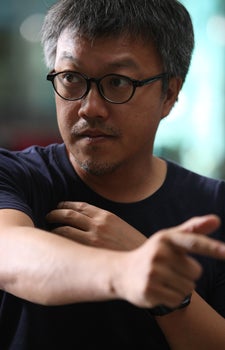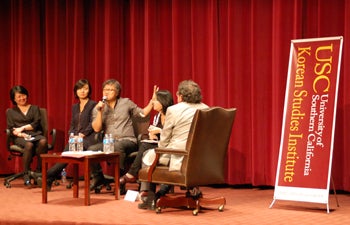Stealing the Spotlight
Korean film royalty visited campus earlier this month for the USC Korean Film Festival, organized by USC Dornsife’s Korean Studies Institute (KSI) and the USC School of Cinematic Arts.
The festival spotlighted the works of director Choi Dong-hoon, one of South Korea’s biggest names in cinema.
Held at the Eileen Norris Cinema Theatre, the two-day festival featured screenings of all of Choi’s blockbuster films, many of which are populated with double-crossing criminals, epic heists and even a bit of Korean folktale wizardry.
“We were extremely excited to get the highest-grossing film director in South Korea to speak at the festival,” said David Kang, KSI’s director. “Dong-hoon was incredibly humble and a lot of fun to talk to. Not at all what you think the stereotypical big-time director might be.”

Arguably the most consistently successful directors working in contemporary Korean cinema, Choi Dong-hoon has produced four commercial hits. Here, he speaks at USC. Photo courtesy of The Korea Times.
He said the festival and Choi’s panel discussion adhere to the mission of KSI.
“Our goal is to link Korea with America,” Kang said, “to educate our students about contemporary political, economic and social issues confronting modern Korea. And to show Korean culture.”
In his own country, Choi’s name is inescapable. His current film, The Thieves, follows a group of cunning jewel thieves as they try to steal a $20 million diamond locked away in a Macau casino — and turn on one another before the job is done. With its quirky characters and exhilarating set pieces and montages, it has drawn in enough moviegoers to become the highest-grossing film in South Korea’s history. That’s saying a lot for a film industry that has come of age, converting new fans throughout Asia and the United States alike.
Korean cinema has been exploding in Korea and all across East Asia for the past two decades, 1999 becoming a watershed moment. That year marked the start of Hallyu — or “Korean wave” — a term coined by a Beijing journalist to describe the spreading popularity of Korean culture, ranging from pop music to food. One could argue that Psy’s 2012 hit “Gangnam Style” was a recent breakthrough of the Korean wave into American culture.
Korean cinema, however, has developed its own momentum. Choi Dong-hoon’s action sequences seem to have opened a new chapter in Korean cinema.

Korean director Choi Dong-hoon (center) tells the audience at the USC Korean Film Festival that his films portray Korea’s more intense, emotional side. Photo by Linda Kim.
The unassuming, 43-year-old Choi is thoughtful and soft-spoken in person, but lights up when asked to explain his love for the heist genre. He counted classics among his favorites: Stanley Kubrick’s The Killing, John Huston’s The Asphalt Jungle and Jean-Pierre Melville’s Le Samouraï.
“In the world we are living in, there are clear distinctions between good and bad, whether we are educated, or rich or poor,” Choi said through a translator. “In a heist film, they are all criminals. But within that group of criminals, you have to figure out which one is good and which is bad.”
There’s an air of cool in heist films, too — something that plays well with Korean audiences. When asked to describe the distinctive essence of Korean movies, Choi pointed out that his culture is very driven by relationships and the temperament of its people.
Koreans “have a hot temperature. There’s a very emotional side to the culture. In films, all the characters are ‘cool,’ ” Choi said. He jokingly affected a laidback confidence — the swagger of a Hollywood safecracker.
What Choi wants to do, however, is portray Korean culture for the world the way he sees it, with a more intense, emotional side.
“The Koreans want to be cool, they want to look cool,” he said. “But inside of them it’s very hot.”